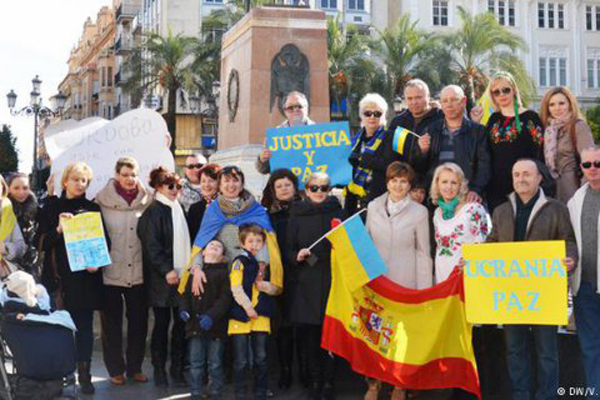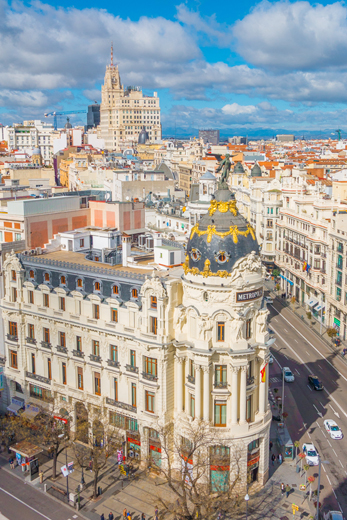Spain
Spain. A country (2020 pop 47,450,795) in southestern Europe occupying the majority of the Iberian Peninsula as well as the Canary Islands and Balearic Islands. It has an area of 505,990 sq km. According to Arabic chronicles Slavs, the ancestors of Ukrainians from the Black Sea coast, served as slaves, soldiers, and scholars to the Arab rulers of Spain. In the 17th century, as the exploits of the Zaporozhian Cossacks against the Turks became widely known throughout Europe, a number of books on Ukraine and the Cossacks appeared in Spain. Occasionally, Cossacks served as mercenaries in the Spanish armies. During the Napoleonic Wars some Ukrainians served in the French forces in Spain.
During the Ukrainian struggle for independence (1917–20) Ye. Kulisher was appointed ambassador of the Ukrainian National Republic to Spain, but he had no opportunity to serve in this capacity. Ukrainians fought on both sides in the Spanish Civil War (1936–9). A separate Ukrainian unit, the Shevchenko Company, was active on the republican side and published its own paper, Borot’ba. During the course of the Spanish Civil War, the Soviet Union accepted a significant number of orphans from Spain. A group of such orphans that arrived in March 1937 resided for several weeks in the resort town of Artek in Ukraine before moving to Moscow. Some of the evacuees were settled in Ukraine, where homes for Spanish children were established. The one in Kyiv was organized toward the end of 1937 and housed over two hundred children. Two others were located in Kherson and Kharkiv. In addition, there were special homes for sick children in Odesa and the Crimea (Yevpatoriia). A number of the Spanish evacuees in the Soviet Union were permitted to return to Spain during the Nikita Khrushchev era, in 1956–57. Others returned after the collapse of the USSR.
During the Second World War Yurii Karmanin served as an information officer of the Organization of Ukrainian Nationalists in Spain. After the war a small Ukrainian community established itself in Spain, chiefly in Madrid. From 1947 a group of 25 or 30 young Ukrainian refugees supported by Obra Católica de Asistencia Universitaria studied in Spain. The students formed a choir and dance group, the Obnova Society of Ukrainian Catholic Students (1947) and the Ukrainian Student Hromada (1956). The Obnova society began with 26 members and its first head was Karmanin. It ceased to exist in 1962. A few Ukrainian families also settled in Madrid. By 1953 the Ukrainian community numbered 68 members. The Association of Ukrainian Friends of Spain, headed by A. Kishka, was set up in 1958. A Ukrainian program was broadcast three times per week (1951–5) and then daily on the national radio. In 1952 a Ukrainian section was established at the Centro de Estudios Orientales under its director, Rev. Santiago Morillo. The center’s journal, Oriente (renamed Oriente europeo in 1956), published many articles on Ukrainian questions. The monthly Las cartas de España came out in Ukrainian, English, Polish, Czech, Slovak, Romanian, Hungarian, and Croatian (1950–1). Concerts and other performances by Ukrainian students have popularized Ukrainian culture among the wider public. Two Ukrainian political institutions were established in Spain: a representation of the executive board of the Ukrainian National Council and a delegation of the Anti-Bolshevik Bloc of Nations. In 1968 the Ukrainian Community in Spain (Ukrainska Hromada v Espanii) was formed. Its first head was Oleh Zabara, a specialist in nuclear power engineering.
From time to time the Ukrainian community in Spain was visited by Ukrainian Catholic clergy and Church leaders from abroad. At the end of the 1940s a parish was created for Ukrainian Catholics in Madrid. The Divine Liturgy was celebrated by priests who were familiar with the Ukrainian rite, principally by Fr. Segundo Benito Galindo, and earlier, by Frs. Santiago Morillo and Jesús Aguirre. Services would also be attended by Ukrainian Orthodox.
Spanish themes have an important place in Ukrainian literature. They are at the heart of masterpieces such as Lesia Ukrainka’s Kaminnyi hospodar (The Stone Host), Natalena Koroleva’s Predok (Ancestor), and Bohdan Ihor Antonych’s Al'kazar (Alcazar). Danylo Mordovets and Koroleva (a Ukrainian writer of Spanish origin) have written travel accounts of Spain. Translations of Spanish literature into Ukrainian have been done by M. Ivanov, Mykola Lukash, Bohdan Boychuk, D. Buchynsky, Yurii Pokalchuk, and others.
In the early 1990s, the Ukrainian community in Spain was estimated to comprise 140 people, of whom about twenty were exclusively of Ukrainian ancestry and the remainder were the offspring of mixed marriages. About a quarter were school-aged children or pre-schoolers. Nearly 30 percent had a university education and two were university professors. In addition, there were twelve engineers, five physicians, five pharmacists, and one veterinarian.
The government of Spain recognized Ukraine as independent on 31 December 1991, and the commencement of diplomatic relations between the two countries followed on 30 January 1992. In August of that year a Spanish embassy was established in Kyiv. The Ukrainian embassy in Spain was opened in Madrid in June 1995. In addition to the embassy in Madrid, there also is a general consulate in Barcelona. President Leonid Kuchma conducted a state visit to Spain in 1996.
In response to the 1991 Ukraine’s Declaration of Independence and events in Ukraine, new organizations in Spain appeared. They included the Ukrainian Association in Spain (Ukrainska Asotsiatsiia v Espanii/Asociación ucraniana en España) in Madrid (from 1994, and headed by Teodor Barabash), which began with 54 members, and the Association of Friends of Ukraine in Barcelona (Asotsiatsiia Pryiateliv Ukrainy v Katalonii/Associació d’Amics d’Ucrania). Also active in Spain at that time was the Association of Hispanic-Ukrainian Friendship (Asociación de Amistad Hispano-Ucraniana). Groups of children affected by the Chornobyl nuclear disaster have been invited to Spain for certain blocks of time.
Ukrainian immigration to Spain assumed a mass character from the early 1990s. Estimates of the number of Ukrainians in the country in the 2000s ranged from 100,000 to 200,000. In 2005, there also were an estimated 200,000 Ukrainians in neighbouring Portugal. The homepage of the Embassy of Ukraine in Spain noted in June 2004 that according to Spanish sources there were 103,328 citizens of Ukraine in the country, of whom 21,579 had legal status and nearly 82,000 others had no legal status. From its collection of data, the embassy presented the female-male ratio of Ukrainian citizens in Spain as 6.5 to 3.5. Some 90 percent of the women were between the ages of twenty and forty-five, and 95 percent of the men were between the ages of eighteen and forty-five. Ten percent of the immigrants had acquired higher education and another twenty percent, specialized secondary education. Other statistics provided by the embassy concerned the marital status of the immigrants (60 percent married, 25 percent separated, and 15 percent unmarried), their regions of provenance (70 percent were from Lviv oblast, Ternopil oblast, Ivano-Frankivsk oblast, Rivne oblast, Volhynia oblast, and Khmelnytsky oblast), and their ethnic composition (Ukrainians 75 percent, Russians 15 percent, Armenians 3 percent, Tatars 2 percent, Jews 1 percent, and others 4 percent).
According to the Ukrainian embassy, the Ukrainian citizens were distributed across Spain as follows: Cataluña, Valencia, and Murcia: 35,000; Castilla-La Mancha and Andalucia: 25,000; Madrid (city and province): 20,000; Extremadura and Castilla y León: 11,000; the Canary and Balearic Islands: 2,000; and elsewhere: 8,000. The majority (80 percent) of Ukrainians have jobs. A minority are engaged in casual work, are job-seekers, or depend on beneficent organizations. The sectors in which Ukrainians are employed comprise the following: agriculture (harvesting fruits and vegetables, as well as food processing), 45 percent; construction, 30 percent; caring for seniors, children, and the sick, 15 percent; and the service sector (hotels, cafeterias, restaurants, nightclubs, repairs, etc.), 10 percent.
It is not known the degree to which Latin Americans of Ukrainian origin have settled in Spain. In the mid-1960s, the Sambir-born mining engineer and geophysicist Ilarion Ortynsky lectured in geophysics in Quito, Ecuador, before coming to Spain in 1967 after additional stints in Iran and Turkey. In Spain, under the auspices of UNESCO, he helped organize and taught at a mining school in Oviedo, where he lived until his passing in 1974. Argentineans reportedly of Ukrainian descent have in the past played for professional soccer clubs in Europe, including in one known case in Spain (Diego Fernando Klimowicz for the club Valladolid). As of 2005, the Odesa-born Dimitri Piterman is president of the premier division soccer club Alavés in northern Spain (before that, in 2003, he was president of Racing Santander, also in Spain).
In 2004, the following organizations were active in Spain: the Union of Ukrainians in Madrid (Unión de los ucranianos en Madrid/Spilka ukraintsiv v Madrydi), president: Teodor Barabash; the Compatriots Association (Asociación ‘Paisanos’/Asotsiatsiia ‘Kraiany’), also in Madrid, president: Oleg Kuba; The Ukraine Association of Ukrainian Workers and Professionals in Spain (Asociación Emprendedora de Trabajadores y Profesionales ucranianos en España ‘Ucraina’/Asotsiatsiia ukrainskykh robitnykiv ta profesionaliv v Ispanii ‘Ukraina’) in Huelva, president: Mykolay Sernetskiy; the Ukraine Association (Asociación ‘Ucraina’/Asotsiatsiia ‘Ukraina’) in the city of Valencia, president: Mikhaylo Petrunyak; the Compatriots Association (Asociación ‘Compatriotas’/Asotsiatsiia ‘Spivvitchyznyky’) in Oviedo, president: Vadim Plotnikov; the ‘Union of Immigrants’ Association (Asociación ‘Union de Inmigrantes’/Asotsiatsiia ‘Soiuz imihrantiv’) in Villarrobledo (in Albacete), president: Iryna Ivanova; the Association of Ukrainians in Cataluña (Asociación de los ucranianos en Cataluña/Asotsiatsiia ukraintsiv u Katalunii) in Barcelona, president: Volodeymir Gretchin; the Compatriots Association (Asociación ‘Compatriotas’/Asotsiatsiia ‘Spivvitchyznyky’) in Santa Cruz de Tenerife in the Canary Islands, president: Petro Rotar; the ‘Hispanic-Ukrainian Alliance’ Association (Asociación ‘Alianza hispano-ucraniana’/Asotsiatsiia ‘Ispano-ukrainskyi alians’) in Figueres, Cataluña, president: Elena Alvarez; and the Ukrainian Cultural Centre in Cataluña (Asociación ‘Centro cultural ucraniano en Cataluña’/Asotsiatsiia ‘Ukrainskyi kulturnyi tsentr u Katalonii’), president: Svitlana Markova. Together, these associations embrace approximately 11,000 people.
Ukrainian organizations in Spain belong to the central representative body the Federation of Ukrainian Associations in Spain (Federación de las asociaciones de España/Federatsiia ukrainskykh asotsiatsii v Ispanii), which is headed by Mikhaylo Petruniak in the city of Valencia. It was formally registered on 23 May 2003. As of 2005, it is a member of the World Congress of Ukrainians. The regularization of the status of Ukrainians in Spain has been one of the goals of the Federation. In February 2005 the Spanish government began to regularize illegal immigrants by issuing one-year residency and work permits.
A number of parishes of the Ukrainian Orthodox church and the Ukrainian Catholic church were created in recent years. Ukrainians have been using Roman Catholic churches for their services. The following priests have been serving the Ukrainian Catholic community in Spain: Fr. Oleksandr Dorykevych in Alicante; Fr. Victor Parkomenko in Cartagena; Fr. Miguel Ambrós in Palma de Mallorca; Fr. Dmytro Savchuk in Huelva; and Fr. Ivan Lypka in Madrid. In January 2005 Bartholomew I, the ecumenical patriarch of Constantinople, appointed Ukraine-born Ilarion Rudnyk the auxiliary bishop to Archbishop Epiphanios, the Orthodox metropolitan of Portugal and Spain. In 2005 the Hispanic Orthodox Diocese was incorporated with the Diocese of Donetsk and Mariupol (under Bishop Yurii Yurchyk) of the Ukrainian Orthodox Church-Kyiv Patriarchate (Western Rite). Its Episcopal see is the Capilla de Santa Helena in Seville. The Hispanic Orthodox Diocese also has missions in Argentina, Brazil, Costa Rica, Cuba, Portugal, and South Africa.
In Ukraine, the Ukraine-Spain Society for Friendship and Cultural Relations has operated in Kyiv since December 1993.
BIBLIOGRAPHY
Buchynsky, Dmytro. ‘Ukraïntsi v Ispanii’ in Ukraïntsi u Vil'nomu Sviti. Iuvileina knyha Ukraïns'koho Narodnoho Soiuzu, 1894–1954 (Jersey City 1954)
Romanyk, Nestor. ‘Ukrainians in Spain’ in Ukraine and Ukrainians throughout the World: A Demographic and Sociological Guide to the Homeland and its Diaspora, ed. Ann Lencyk Pawliczko (Toronto, Buffalo, and London 1994)
Iarymovych, V., Bilyk, O., and Volynsky, M. Narys istoriï ukraïns'koi students'koï hromady ta ukraïns'kykh poselen' v Ispanii (1946–1996) (Philadephia and Madrid 1997)
Serge Cipko
[This article was updated in 2005.]
.jpg)

